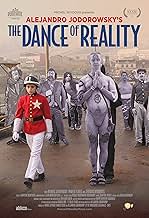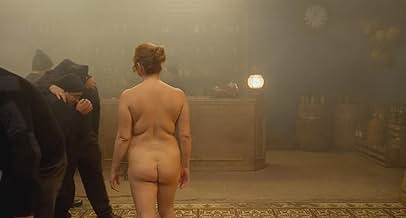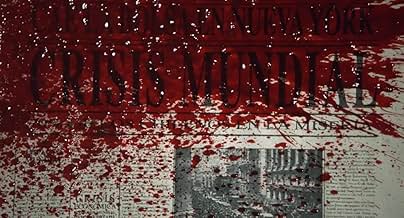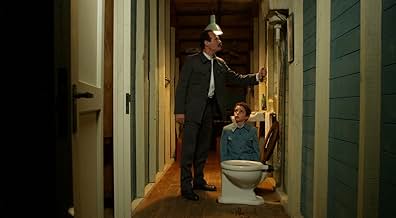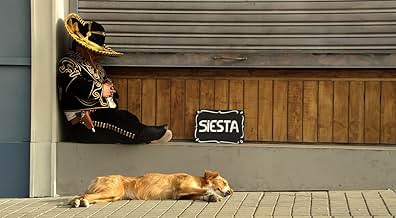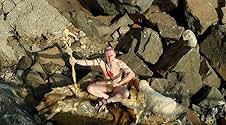In una cittadina cilena, il figlio di una coppia di emigrati, composta da un severo padre comunista e da una madre amorevole ma debole, cerca di farsi strada in una società che non comprende... Leggi tuttoIn una cittadina cilena, il figlio di una coppia di emigrati, composta da un severo padre comunista e da una madre amorevole ma debole, cerca di farsi strada in una società che non comprende le loro origini ebraico-ucraine.In una cittadina cilena, il figlio di una coppia di emigrati, composta da un severo padre comunista e da una madre amorevole ma debole, cerca di farsi strada in una società che non comprende le loro origini ebraico-ucraine.
- Regia
- Sceneggiatura
- Star
- Premi
- 5 vittorie e 9 candidature totali
- Theosophist
- (as Cristobal Jodorowsky)
- Jorobada
- (as Alizarine Ducolomb)
Recensioni in evidenza
I gotta admit I'm not always convinced. "The Incal" is a wonderful comics classic, but some of his later (serialised) books seem to fizzle out to nothing after they've taken years to complete. They've given me quite a bit of frustration - and the reviewers in the comics press often seem equally frustrated.
I bought his return to movie making "Santa Sangre" when it was first released on VHS back around 1990. And I love this movie! It's in my opinion completely coherent and satisfying, and I've seen it many times.
The long awaited DVD box-set of his older 1970s work was a bit of a disappointment. Some good scenes in the movies, but also a lot of semi- amateurish wannabe-spiritual 1970s-style hippie-rambling. The best part of the box was the very enjoyable documentary "La constellation Jodorowsky", which you might be able to find on you-tube with a bit of luck.
But as for his new movie: It's good. VERY good. Possibly even better than "Santa Sangre". In some ways it seems like a remake of "El Topo", except without the western-trappings and based more closely on his own childhood. The main character (Jodorowsky's father) undergoes much the same transformation as El Topo, but the narrative is much more coherent and gripping. I was lucky enough to attend a screening with Jodo's son (who played El Topo's son, and plays Jodo's father in this movie), and while I was mesmerized by the movie even before listening to Brontis Jodorowsky - who is a funny, cool and sensible down-to-earth guy - the information he gave me made me appreciate it even more.
Basically the first part of the movie is a magical realist version of Jodo's childhood. But then the 'psycho magic' therapy that Jodo practices (in his second career as a kind of Tarot-card - or whatever - therapist) starts to play a part, and the movie becomes a kind of exorcism of the hard asshole'ish macho-part of his dictatorial father - the movie gives the father-character the journey of learning he never had in real life, making him a better wiser man that real-life Jodorowsky is able to make (symbolic) peace with. Anyway, this may sound like a lot of nonsense, but it made a lot of sense when Brontis Jodorowsky talked about it, and it makes for a compelling movie, even without the background information. It's as good as any Fellini-meets-Latin- American-Magical-Realism-movie could ever hope to be.
Basically I'm just happy that Jodo has now made two movies and one graphic novel ("The Incal") that I'm able to embrace and enjoy 100%.
He creates a metaphorical world where we follow a young Jodrowsky and his father full of bright colours and some very quirky characters. There are his signature marks of male and female nudity bizarre imagery and amputees. I can't help but feel the film was more about his father growing up than about Jodrowsky as his father changes from the macho- Stalin worshipping God denying homophobic hypocrite to a broken god fearing hero of the people. Along with that we some real nice cinematography and is overall a great film it is not by any means for the casual movie goer as they would be repulsed by some of what goes on in this film.
But it's almost redeemed by a final section where finally the older and younger director/character return for a farewell scene involving a dock and a boat. If this does turn out to be his last film it's one of the great film exits in history.
So it's too bad the script loses focus right in the middle and that the whole thing feels way too long. Might be a film that plays better if you don't watch it all in one sitting.
Visuals are typically vivid but now have a video quality that the HD "photography" that is distracting at first when comparing the richer film colors of his earlier work.
A worthy film that unfortunately can't sustain a strong first third.
Watch it, understand it, feel it. After all its Jodorowsky's Cinema. Brutal, surreal, funny and satirical. 10 out of 10
It is not an unknown occurrence in movies that a respected artist takes an inordinately long hiatus from the medium: David Lean, Sergio Leone and Stanley Kubrick are perhaps the most egregious examples but Jodorowsky's 23 years is probably the lengthiest sabbatical yet! Although he had been threatening to make a sequel to EL TOPO for the last decade – his screenplay of THE SONS OF EL TOPO was even glimpsed sitting on the man's shelves in the aforementioned "Dune" documentary! – it is perhaps unsurprising that it took the now-85-year-old Jodorowsky's most personal project, an adaptation of his own autobiography, to lure him back to the cinema (even if that only came about as a result of a reteaming with his DUNE producer Michel Seydoux). Equally plausible is the fact that, for a man with such a long and varied career, one film would not be enough to tell his whole life-story and, as his young son Adan said in the Q&A which followed the film's screening, Alejandro is currently working on the second installment! I, for one, am looking forward to it
In keeping with the autobiographical nature of the film, his oldest son Brontis (who played the child in EL TOPO) has the lead role here of Jodorowsky's strict businessman father, Cristobal plays a Buddhist mystic who runs around practically naked, Adan plays a long-haired, bespectacled anarchist and Alejandro himself appears as the ruminating guardian angel of his put-upon younger self! Although I would be the first one to admit that I much prefer the Luis Buñuel brand of Surrealism rather than the self-indulgent obscurantist style propagated by the likes of Federico Fellini, Fernando Arrabal (Jodorowsky's own partner in his "Panic" movement days) and David Lynch (the director who ultimately brought DUNE to the big-screen, albeit disastrously, in 1984!), I have to say that sitting through the not unsubstantial 130-minute duration of THE DANCE OF REALITY made me realize that even Jodorowsky's most outre' ideas in his previous films might well have had their seeds in his troubled childhood in the desert Chilean village of Tocopilla.
The film can be roughly divided into three segments: the first part concentrates on the boy's physical and mental abuse at the hands of his Ukranian-Jewish father (including vignettes involving red shoes and the fire brigade); the second on the father's ineffectual political activities (including an amusing failed assassination attempt at a best-dressed dog contest and a lengthy episode as the Chilean dictator's horse groomer); and, finally, the prodigal father's return homeward (after suffering from a bout of amnesia following much torture at the hands of the tyrannical regime). The father (incidentally, Brontis' appearance here turns him into a virtual dead ringer for Hollywood actor Peter Sarsgaard!) had been a circus performer and is portrayed as a staunch atheistic Communist, the mother only communicates in operatic arias and the young boy is seen sporting a blonde wig at the latter's insistence (in emulation of her own father's mane) and the former's chagrin. While berating his son for looking effeminate and mingling with the local mystics and mutilated soldiers-turned-paupers, Jodorowsky Sr. is shown consorting with whores, transvestites and political subversives in his weekly night-time trysts to the local tavern.
As can be gleaned from a cursory glance at the storyline and as was to be expected from this director, despite the reflective and occasionally even pastoral mood that permeates the proceedings, the film cannot fail but include a surfeit of full-frontal nudity which result in a couple of strong scenes: both father and mother get to shed their clothes but, instead of using it during scenes of sexual activity, the elder Jodorowsky shows his father being humiliated and tortured, himself as a young boy being comforted by his stark-naked, big-breasted mum and the latter miraculously healing her leprosy–stricken husband by urinating on him!! In such a godless environment (where religious relics are dumped into the toilet bowl), even horses can become objects of desire as the Chilean leader is depicted metaphorically having a virtual orgasm while astride his white-maned Bucephalus and, consequently, it is the latter who gets poisoned instead of its owner who is in turn devastated by the loss! The director's typically skewed sense of humour, then, is evident in the recurring presence of a midget barker, forever donning outlandish costumes, in an attempt to draw crowds to Jodorowsky's lingerie shop - but which are mostly unappreciated by his irascible employer!
While the occasional longueur does make itself felt (particularly during the second half), the film moves at a surprisingly breezy pace thanks to a compelling narrative and one is certainly thankful for it – especially considering the feature film started screening at around 10:00 p.m.! Jodorowsky's visual artistry is as sharp as ever and one barely realizes that the movie was shot on digital. Adan Jodorowsky's score is definitely an asset and, when asked about what inspired him to write it during the following Q&A session, he mentioned not just his father's self-penned music for EL TOPO and THE HOLY MOUNTAIN but also the works of legendary film composer Bernard Herrmann!
Lo sapevi?
- QuizThis was Alejandro Jorodowsky's first movie in 23 years.
- Citazioni
Alejandro as a child: The darkness is swallowing everything. It's going to devour us.
Sara: Alejandrito, do I love you?
Alejandro as a child: Yes, Mama.
Sara: How much?
Alejandro as a child: From the sky to the earth.
Sara: This is not my love, it comes from God. I am merely the sender. As God creates all, so we all radiate His love. My son, the darkness loves you as much as I do, for it is God's shadow.
- ConnessioniEdited into Poesia senza fine (2016)
I più visti
- How long is The Dance of Reality?Powered by Alexa
Dettagli
- Data di uscita
- Paesi di origine
- Siti ufficiali
- Lingua
- Celebre anche come
- The Dance of Reality
- Luoghi delle riprese
- Aziende produttrici
- Vedi altri crediti dell’azienda su IMDbPro
Botteghino
- Budget
- 3.000.000 USD (previsto)
- Lordo Stati Uniti e Canada
- 293.680 USD
- Fine settimana di apertura Stati Uniti e Canada
- 24.768 USD
- 25 mag 2014
- Lordo in tutto il mondo
- 558.636 USD
- Tempo di esecuzione
- 2h 13min(133 min)
- Colore
- Mix di suoni
- Proporzioni
- 1.85 : 1

![Guarda Tráiler [OV]](https://m.media-amazon.com/images/M/MV5BYTE4NDM1YWItYTRmNi00OGQyLWJhZTYtYTY5OTU5NTJlOGY4XkEyXkFqcGdeQXRyYW5zY29kZS13b3JrZmxvdw@@._V1_QL75_UX500_CR0)



